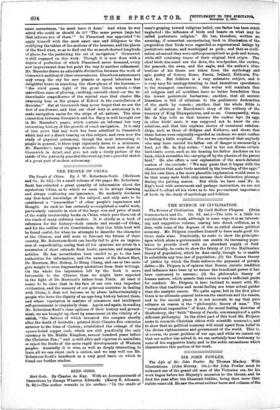THE PEOPLE OF CHINA.
The People of China. By J. W. Robertson-Scott. (Methuen and Co. 3s. 6d.)—In a small volume of 180 pages Mr. Robertson- Stott has collected a great quantity of information about the mysterious China, as to which we seem to be always learning and always confessing our ignorance. He modestly disclaims any first-hand knowledge of the subject, and only asks to be considered a " transmitter " of other people's experience and thought. As such he has certainly accomplished a useful work, particularly valuable in view of the large size and price of moat of the really trustworthy books on China, which puts them out of the reach of many ordinary readers. It is chiefly as a book of reference for the history—both remote and recent—of China, and for the outline of its Constitution, that this little book will be found useful, for when he attempts to describe the character of the Chinese, and still more to forecast the future of their country, Mr. Robertson-Scott can hardly fail to give an impres- sion of superficiality, seeing that all his opinions are given in a succession of short extracts from books, speeches, and magazine articles. He has nevertheless been careful to go to the best authorities for information, and the names of Sir Robert Hart, Dr. Morrison, Mrs. Bishop, Li Hung Chang, and one or two more give weight to even fragmentary quotations from their writings. On the whole the impression left by the book is more favourable to the Chinese than we might have expected in the light of Dr. Morrison's letters from Pekin. At least it seems to be clear that in the face of our own very imperfect civilisation, and the memory of our grievous mistakes in dealing with China, it does not become us to abuse indiscriminately a people who have the dignity of an age-long history behind them, and whose reputation in matters of commerce and intelligent self-government is singularly clean. Again and again, in reading Mr. Robertson-Scott's clear epitome of their history and govern- rhent, we are brought up short by amazement at the vitality of a nation, "the fathers of which invented the compass shortly after the death of Aristotle ; printed their Classics five centuries anterior to the time of Caxton ; established the coinage of the square-holed copper cash, which are still practically the only currency in the Middle Kingdom, several hundred years before the Christian Era ; " and is still alive and vigorous to assimilate or reject the fruits of the more rapid developments of Western peoples. Assuredly it is wise, as well as deeply interesting, to learn all we can about such a nation, and we may well use Mr. Robertson-Scott's handbook as a very good basis on which to found our further studies.






















































 Previous page
Previous page